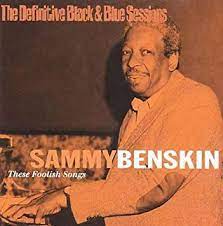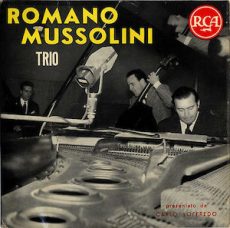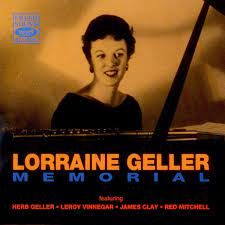
Daily Dose Of Jazz…
Samuel Benskin was born in The Bronx, New York on September 27, 1922 and made his professional debut around 1940 as piano accompanist to singer and guitarist Bardu Ali. He worked throughout the 1940s with among other jazz musicians Stuff Smith, Benny Morton and Don Redman. The 1950s witnessed Sammy leading his own piano trio, appearing as a soloist and accompanying singers Roy Hamilton, Dinah Washington and Al Hibbler. In 1954 he also joined a group, The Three Flames, which also featured Tiger Haynes.
By the end of the decade with a band credited as The Spacemen, Sammy recorded an instrumental, The Clouds, written and produced by Julius Dixson for his Alton record label. A departure from jazz, the song’s original vocals were removed and presented as an instrumental. It went to No. 1 on the Billboard R&B chart, and No. 41 on the pop chart. The song was the first number one on any chart released by an African-American owned independent record label, predating Motown’s first No. 1 by a year.
From the 1960s Benskin worked primarily as a vocal coach, arranger and producer. In 1986, he recorded an album in Paris, France for Black & Blue Records, These Foolish Songs. Pianist Sammy Benskin transitioned in Teaneck, New Jersey on August 26, 1992 at 69.
More Posts: arranger,bandleader,history,instrumental,jazz,music,piano,producer

Daily Dose Of Jazz…
Romano Bruno Mussolini was born on September 26, 1927 in Villa Carpena, Forlì,Italy. He was the fourth child and youngest son of Il Duce, Benito Mussolini. He studied music as a child, playing classical pieces with his father on the violin. After World War II, he started playing jazz under the alias Romano Full.
By the mid-1950s, he formed a trio and in 1956 released a self-titled record featuring Lilian Terry on vocals and trumpeter Nunzio Rotondo on RCA Records. The Sixties saw him form the Romano Mussolini All Stars, which became one of Italy’s foremost jazz bands.
The All Stars recorded a well-received record Jazz Allo Studio 7 in 1963 with At the Santa Tecla following a year later. Romano’s band toured internationally with Dizzy Gillespie, Duke Ellington, Helen Merrill and Chet Baker, among others. In the 1990s he recorded two more albums, Perfect Alibi and Soft and Swing.
His playing style has been described as “like a slightly melancholic Oscar Peterson. Occasionally inspired, he was always efficient; he made the refrains run on time.
Pianist Romano Mussolini, who was also a painter and film producer, transitioned on February 3, 2006, at the age of 78, in a hospital in Rome, Italy from heart problems.
More Posts: bandleader,history,instrumental,jazz,music,piano

Three Wishes
Zoot Sims was given the proposition of three wishes by Pannonica that if they could be fulfilled what would they be and he said this to her:
- “Peace of mind.”
- “Woman I could live with.”
- “Piece of ground.”
More Posts: baroness,history,instrumental,jazz,music,pannonica,saxophone,three,wishes

Daily Dose Of Jazz…
Lorraine Winifred Geller was born Lorraine Walsh on September 11, 1928 in Portland, Oregon. She started out with the all-female big band Sweethearts of Rhythm, based in New York. She met saxophonist Herb Geller, married him in 1951, and together they moved to Los Angeles, California where they played with many musicians on the West Coast jazz scene, such as Shorty Rogers, Zoot Sims, Stan Getz, and Red Mitchell. She also did sessions with Charlie Parker and Dizzy Gillespie.
In 1957, she accompanied Kay Starr and the following year, concentrating on raising her daughter, she pared down her performances. She did, however, play at the first Monterey Jazz Festival. On October 13, 1958 pianist Lorraine Geller transitioned in Los Angeles, attributed to heart failure or pulmonary infection.
More Posts: bandleader,history,instrumental,jazz,music,piano

Daily Dose Of Jazz…
Joki Freund was born Walter Jakob Freund on September 5, 1926 in Höchst, Frankfurt am Main, Germany. He began playing the accordion as a child, switching to tenor saxophone after World War II ended.
Early in the postwar era, he played with Joe Quitter, Carlo Bohlander, Gerry Weinkopf, Joe Klimm, and Jutta Hipp, before forming his own ensemble. He began performing with American musicians, including Donald Byrd, Art Taylor, and Doug Watkins during their European festival appearances.
He went on to play with and arranged for Albert Mangelsdorff in the jazz orchestra of Hessischer Rundfunk, and Erwin Lehn in the Süddeutscher Rundfunk orchestra. He played with the Frankfurt Jazz Ensemble on soprano saxophone in the 1970s, also performing as a leader around this time.
Saxophonist Joki Freund, who predominantly played in a quintet setting but also in orchestras or big bands, transitioned on February 15, 2012 in Schwalbach am Taunus, Germany.
More Posts: arranger,bandleader,history,instrumental,jazz,music,saxophone



